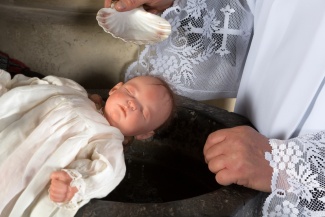 The water is poured and the words are said: “I baptize you in the name of the Father, and of the Son, and of the Holy Spirit.” As I approach the newly baptized baby held in the arms of his mother or father, I bow, make the sign of the cross, and venerate (kiss) the child as I would an icon. Doing so, I venerate Jesus Christ present in this child. The child, having been washed of sin, filled with the Holy Spirit, and clothed in Christ, is now a holy image of him who is the perfect image of the Father.
The water is poured and the words are said: “I baptize you in the name of the Father, and of the Son, and of the Holy Spirit.” As I approach the newly baptized baby held in the arms of his mother or father, I bow, make the sign of the cross, and venerate (kiss) the child as I would an icon. Doing so, I venerate Jesus Christ present in this child. The child, having been washed of sin, filled with the Holy Spirit, and clothed in Christ, is now a holy image of him who is the perfect image of the Father.
As the child grows, the image may become tarnished, but it will remain. Just as a work of art is restored, so too the Sacrament of Reconciliation restores the image of Christ in us—washing away the grime and mending brokenness so that the light of Jesus Christ, truly present in us, may shine forth in the world.
“The Father and I are one. . . . Remain in me, as I remain in you” (Jn 10:30; 15:4). In the reception of the Holy Eucharist, our Lord, one with the Father in the unity of the Holy Spirit, comes into us in a wholly unique manner and draws us unfathomably within himself. The presence of Jesus Christ in the Holy Eucharist is of a completely different type than his presence elsewhere. It is substantial; it is of his essence. When we say that Jesus Christ is truly present in the Blessed Sacrament, what we mean is that the Blessed Sacrament is Jesus Christ. While the visible form of bread and wine remain, it is him—not a sign pointing to him, not an object that mediates grace (e.g., a miraculous medal, the brown scapular)—it is Jesus himself.
There is nothing more awe-inspiring, more solicitous of wonder than the mystery of the Holy Eucharist. Jesus is substantially present, as present as the person sitting next to you. Real presence, however, is not limited to substantial presence. Christ’s presence in the baptized, through sanctifying grace, is a real presence, though not substantial. Christ’s presence in our holy icons is representative and real, though not substantial. Christ’s presence in the created order via divine power is real, though not substantial. There is no place where Christ Jesus is absent. “Behind and before you encircle me and rest your hand upon me. . . . From your presence, where can I flee? If I ascend to the heavens you are there; if I lie down in Sheol, there you are” (Ps 139:5, 7–8). The mystery of his presence in the whole created order—sacred and profane—is incomprehensible, demanding reverent silence and awe.
There is no faith that affirms the sacramentality of the whole of creation more than the Christian faith.
In the beginning was the Word, and the Word was with God, and the Word was God. He was in the beginning with God. All things came to be through him, and without him nothing came to be (Jn 1:1–3). All things, coming into being through the Word, bear the imprint of the Word—not the imprint of a stamp but of a watermark, an imprint woven into the very fabric of their existence. As such, all creation declares the glory of God (cf. Ps 19:2) and “Ever since the creation of the world, his invisible attributes of eternal power and divinity have been able to be understood and perceived in what he has made” (Rm 1:20).
Creation itself is sacramental in that God is present in it, reveals himself in it, and through it draws men and women to himself. The sacramentality of creation, however, was incomplete; it was a question left unanswered, a yearning without satisfaction. “And the Word became flesh and made his dwelling among us” (Jn 1:14). By becoming flesh and taking humanity upon himself, Jesus Christ took creation upon himself. The Word of God united in himself the uncreated and the created. By this act, creation becomes not simply a sign pointing to God or a means of encountering God. It is instead elevated to an instrument of union with God in which he, having become man, now makes man divine. This is the sacrament in which man partakes of God. The fullness of this reality on earth is the Sacrament of Sacraments, the Holy Eucharist, Jesus Christ.
Quanah Jeffries holds an M.A. in Theology and is Director of Faith Formation and Evangelization at Christ the King parish in Indianapolis, IN.
This article originally appeared on page 31 of the printed edition.
Art Credit: Baby Baptism image from AdobeStock.
